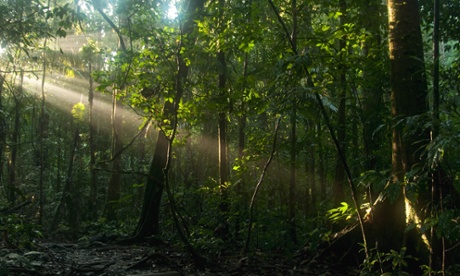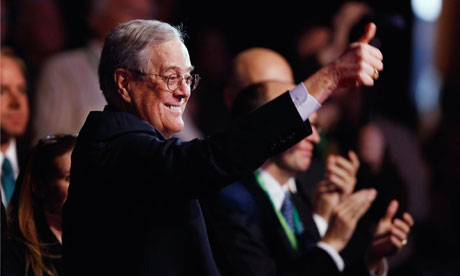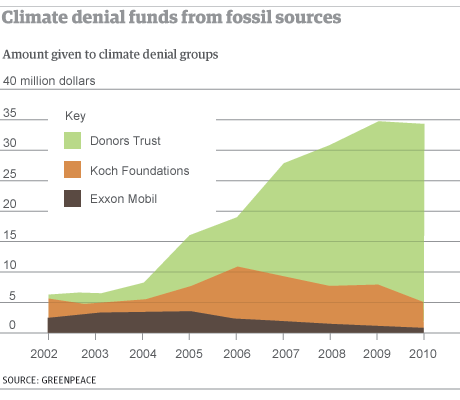It's the great taboo of our age – and the inability to discuss the pursuit of perpetual growth will prove humanity's undoing

'The mother narrative to all this is carbon-fuelled expansion. Our ideologies are mere subplots.' Photograph: Alamy
Let us imagine that in 3030BC the total possessions of the people of Egypt filled one cubic metre. Let us propose that these possessions grew by 4.5% a year. How big would that stash have been by the Battle of Actium in 30BC? This is the calculation performed by the investment banker Jeremy Grantham.
Go on, take a guess. Ten times the size of the pyramids? All the sand in the Sahara? The Atlantic ocean? The volume of the planet? A little more? It's 2.5 billion billion solar systems. It does not take you long, pondering this outcome, to reach the paradoxical position that salvation lies in collapse.
To succeed is to destroy ourselves. To fail is to destroy ourselves. That is the bind we have created. Ignore if you must climate change, biodiversity collapse, the depletion of water, soil, minerals, oil; even if all these issues miraculously vanished, the mathematics of compound growth make continuity impossible.
Economic growth is an artefact of the use of fossil fuels. Before large amounts of coal were extracted, every upswing in industrial production would be met with a downswing in agricultural production, as the charcoal or horse power required by industry reduced the land available for growing food. Every prior industrial revolution collapsed, as growth could not be sustained. But coal broke this cycle and enabled – for a few hundred years – the phenomenon we now call sustained growth.
It was neither capitalism nor communism that made possible the progress and pathologies (total war, the unprecedented concentration of global wealth, planetary destruction) of the modern age. It was coal, followed by oil and gas. The meta-trend, the mother narrative, is carbon-fuelled expansion. Our ideologies are mere subplots. Now, with the accessible reserves exhausted, we must ransack the hidden corners of the planet to sustain our impossible proposition.
On Friday, a few days after scientists announced that the collapse of the west Antarctic ice sheet is now inevitable, the Ecuadorean government decided to allow oil drilling in the heart of the Yasuni national park. It had made an offer to other governments: if they gave it half the value of the oil in that part of the park, it would leave the stuff in the ground. You could see this as either blackmail or fair trade. Ecuador is poor, its oil deposits are rich. Why, the government argued, should it leave them untouched without compensation when everyone else is drilling down to the inner circle of hell? It asked for $3.6bn and received $13m. The result is that Petroamazonas, a company with a colourful record of destruction and spills, will now enter one of the most biodiverse places on the planet, in which a hectare of rainforest is said to contain more species than exist in the entire continent of North America.
 Yasuni national park. Murray Cooper/Minden Pictures/Corbis
Yasuni national park. Murray Cooper/Minden Pictures/Corbis
The UK oil firm Soco is now hoping to penetrate Africa's oldest national park, Virunga, in the Democratic Republic of Congo; one of the last strongholds of the mountain gorilla and the okapi, of chimpanzees and forest elephants. In Britain, where a possible 4.4 billion barrels of shale oil has just been identified in the south-east, the government fantasises about turning the leafy suburbs into a new Niger delta. To this end it's changing the trespass laws to enable drilling without consent and offering lavish bribes to local people. These new reserves solve nothing. They do not end our hunger for resources; they exacerbate it.
The trajectory of compound growth shows that the scouring of the planet has only just begun. As the volume of the global economy expands, everywhere that contains something concentrated, unusual, precious, will be sought out and exploited, its resources extracted and dispersed, the world's diverse and differentiated marvels reduced to the same grey stubble.
Some people try to solve the impossible equation with the myth of dematerialisation: the claim that as processes become more efficient and gadgets are miniaturised, we use, in aggregate, fewer materials. There is no sign that this is happening. Iron ore production has risen 180% in 10 years. The trade body Forest Industries tells us that "global paper consumption is at a record high level and it will continue to grow". If, in the digital age, we won't reduce even our consumption of paper, what hope is there for other commodities?
Look at the lives of the super-rich, who set the pace for global consumption. Are their yachts getting smaller? Their houses? Their artworks? Their purchase of rare woods, rare fish, rare stone? Those with the means buy ever bigger houses to store the growing stash of stuff they will not live long enough to use. By unremarked accretions, ever more of the surface of the planet is used to extract, manufacture and store things we don't need. Perhaps it's unsurprising that fantasies about colonising space – which tell us we can export our problems instead of solving them – have resurfaced.
As the philosopher Michael Rowan points out, the inevitabilities of compound growth mean that if last year'sthe predicted global growth rate for 2014 (3.1%) is sustained, even if we miraculously reduced the consumption of raw materials by 90%, we delay the inevitable by just 75 years. Efficiency solves nothing while growth continues.
The inescapable failure of a society built upon growth and its destruction of the Earth's living systems are the overwhelming facts of our existence. As a result, they are mentioned almost nowhere. They are the 21st century's great taboo, the subjects guaranteed to alienate your friends and neighbours. We live as if trapped inside a Sunday supplement: obsessed with fame, fashion and the three dreary staples of middle-class conversation: recipes, renovations and resorts. Anything but the topic that demands our attention.
Statements of the bleeding obvious, the outcomes of basic arithmetic, are treated as exotic and unpardonable distractions, while the impossible proposition by which we live is regarded as so sane and normal and unremarkable that it isn't worthy of mention. That's how you measure the depth of this problem: by our inability even to discuss it.



